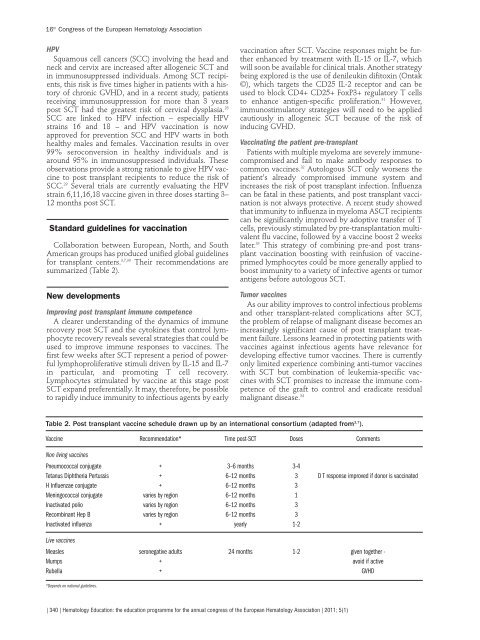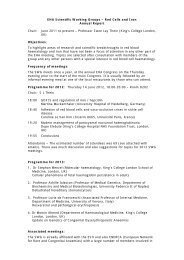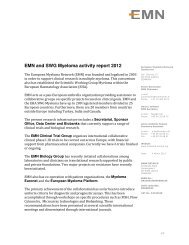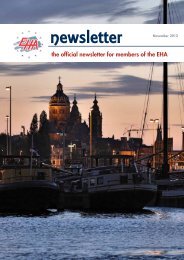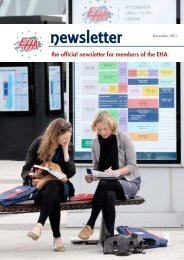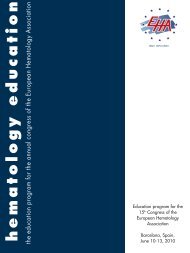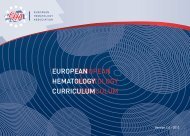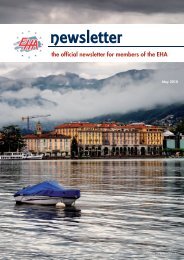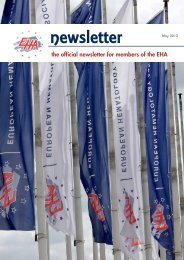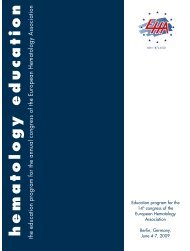H e m a t o lo g y E d u c a t io n - European Hematology Association
H e m a t o lo g y E d u c a t io n - European Hematology Association
H e m a t o lo g y E d u c a t io n - European Hematology Association
Create successful ePaper yourself
Turn your PDF publications into a flip-book with our unique Google optimized e-Paper software.
16 th Congress of the <strong>European</strong> Hemato<strong>lo</strong>gy Associat<strong>io</strong>n<br />
HPV<br />
Squamous cell cancers (SCC) involving the head and<br />
neck and cervix are increased after al<strong>lo</strong>geneic SCT and<br />
in immunosuppressed individuals. Among SCT recipients,<br />
this risk is five times higher in patients with a history<br />
of chronic GVHD, and in a recent study, patients<br />
receiving immunosuppress<strong>io</strong>n for more than 3 years<br />
post SCT had the greatest risk of cervical dysplasia. 28<br />
SCC are linked to HPV infect<strong>io</strong>n – especially HPV<br />
strains 16 and 18 – and HPV vaccinat<strong>io</strong>n is now<br />
approved for prevent<strong>io</strong>n SCC and HPV warts in both<br />
healthy males and females. Vaccinat<strong>io</strong>n results in over<br />
99% seroconvers<strong>io</strong>n in healthy individuals and is<br />
around 95% in immunosuppressed individuals. These<br />
observat<strong>io</strong>ns provide a strong rat<strong>io</strong>nale to give HPV vaccine<br />
to post transplant recipients to reduce the risk of<br />
SCC. 29 Several trials are currently evaluating the HPV<br />
strain 6,11,16,18 vaccine given in three doses starting 3–<br />
12 months post SCT.<br />
Standard guidelines for vaccinat<strong>io</strong>n<br />
Collaborat<strong>io</strong>n between <strong>European</strong>, North, and South<br />
American groups has produced unified g<strong>lo</strong>bal guidelines<br />
for transplant centers. 3,7,30 Their recommendat<strong>io</strong>ns are<br />
summarized (Table 2).<br />
New deve<strong>lo</strong>pments<br />
Improving post transplant immune competence<br />
A clearer understanding of the dynamics of immune<br />
recovery post SCT and the cytokines that control lymphocyte<br />
recovery reveals several strategies that could be<br />
used to improve immune responses to vaccines. The<br />
first few weeks after SCT represent a per<strong>io</strong>d of powerful<br />
lymphoproliferative stimuli driven by IL-15 and IL-7<br />
in particular, and promoting T cell recovery.<br />
Lymphocytes stimulated by vaccine at this stage post<br />
SCT expand preferentially. It may, therefore, be possible<br />
to rapidly induce immunity to infect<strong>io</strong>us agents by early<br />
vaccinat<strong>io</strong>n after SCT. Vaccine responses might be further<br />
enhanced by treatment with IL-15 or IL-7, which<br />
will soon be available for clinical trials. Another strategy<br />
being exp<strong>lo</strong>red is the use of denileukin difitoxin (Ontak<br />
©), which targets the CD25 IL-2 receptor and can be<br />
used to b<strong>lo</strong>ck CD4+ CD25+ FoxP3+ regulatory T cells<br />
to enhance antigen-specific proliferat<strong>io</strong>n. 31 However,<br />
immunostimulatory strategies will need to be applied<br />
caut<strong>io</strong>usly in al<strong>lo</strong>geneic SCT because of the risk of<br />
inducing GVHD.<br />
Vaccinating the patient pre-transplant<br />
Patients with multiple mye<strong>lo</strong>ma are severely immunecompromised<br />
and fail to make antibody responses to<br />
common vaccines. 32 Auto<strong>lo</strong>gous SCT only worsens the<br />
patient’s already compromised immune system and<br />
increases the risk of post transplant infect<strong>io</strong>n. Influenza<br />
can be fatal in these patients, and post transplant vaccinat<strong>io</strong>n<br />
is not always protective. A recent study showed<br />
that immunity to influenza in mye<strong>lo</strong>ma ASCT recipients<br />
can be significantly improved by adoptive transfer of T<br />
cells, prev<strong>io</strong>usly stimulated by pre-transplantat<strong>io</strong>n multivalent<br />
flu vaccine, fol<strong>lo</strong>wed by a vaccine boost 2 weeks<br />
later. 33 This strategy of combining pre-and post transplant<br />
vaccinat<strong>io</strong>n boosting with reinfus<strong>io</strong>n of vaccineprimed<br />
lymphocytes could be more generally applied to<br />
boost immunity to a variety of infective agents or tumor<br />
antigens before auto<strong>lo</strong>gous SCT.<br />
Tumor vaccines<br />
As our ability improves to control infect<strong>io</strong>us problems<br />
and other transplant-related complicat<strong>io</strong>ns after SCT,<br />
the problem of relapse of malignant disease becomes an<br />
increasingly significant cause of post transplant treatment<br />
failure. Lessons learned in protecting patients with<br />
vaccines against infect<strong>io</strong>us agents have relevance for<br />
deve<strong>lo</strong>ping effective tumor vaccines. There is currently<br />
only limited experience combining anti-tumor vaccines<br />
with SCT but combinat<strong>io</strong>n of leukemia-specific vaccines<br />
with SCT promises to increase the immune competence<br />
of the graft to control and eradicate residual<br />
malignant disease. 34<br />
Table 2. Post transplant vaccine schedule drawn up by an internat<strong>io</strong>nal consortium (adapted from 3,7 ).<br />
Vaccine Recommendat<strong>io</strong>n* Time post-SCT Doses Comments<br />
Non living vaccines<br />
Pneumococcal conjugate + 3–6 months 3-4<br />
Tetanus Diphtheria Pertussis + 6–12 months 3 D T response improved if donor is vaccinated<br />
H Influenzae conjugate + 6–12 months 3<br />
Meningococcal conjugate varies by reg<strong>io</strong>n 6–12 months 1<br />
Inactivated pol<strong>io</strong> varies by reg<strong>io</strong>n 6–12 months 3<br />
Recombinant Hep B varies by reg<strong>io</strong>n 6–12 months 3<br />
Inactivated influenza + yearly 1-2<br />
Live vaccines<br />
Measles seronegative adults 24 months 1-2 given together -<br />
Mumps + avoid if active<br />
Rubella + GVHD<br />
*Depends on nat<strong>io</strong>nal guidelines.<br />
| 340 | Hemato<strong>lo</strong>gy Educat<strong>io</strong>n: the educat<strong>io</strong>n programme for the annual congress of the <strong>European</strong> Hemato<strong>lo</strong>gy Associat<strong>io</strong>n | 2011; 5(1)


